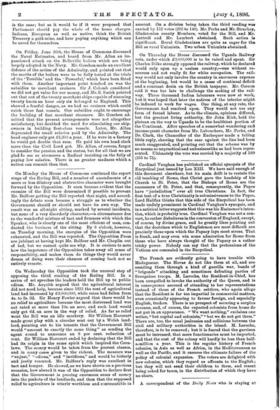On Thursday the House discussed the Uganda Railway vote, under
which 23,000,000 is to be raised and spent. Sir Charles Dilke strongly opposed the railway, which he declared would only open up a useless country,—one without re- sources and not really fit for white occupation. The rail- way would not only involve the country in enormous expense at the beginning, but would be a cause of continual deficit and a constant drain on the British taxpayer. Mr. Curzon said it was too late to challenge the making of the rail- way. Three thousand Indian labourers were now at work, but it was hoped that later the natives of the interior might be induced to work for wages. One thing, at any rate, the Government had resolved upon. They would not use any form of forced labour. As to the climate, opinions differed, but the greatest living authority, Sir John Kirk, held the- plateau on the way to Uganda to be the healthiest portion of the Continent. After speeches of a somewhat wandering and inconsequent character from Mr. Labouchere, Mr. Perks, and Dr. Clark, the Chancellor of the Exchequer made a telling little reply, showing that the case against the line had been much exaggerated, and pointing out that the scheme was by no means so unpractical and unbusinesslike as had been repre- sented. Ultimately the vote was carried by a majority of 180 (255 to 75).










































 Previous page
Previous page